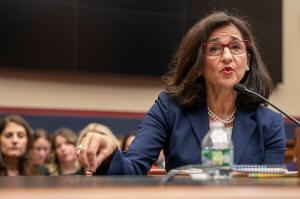Columbia University president takes heat at congressional antisemitism
hearing
 Send a link to a friend
Send a link to a friend
 [April 18, 2024]
By Gabriella Borter [April 18, 2024]
By Gabriella Borter
(Reuters) - A U.S. congressional committee on Wednesday accused Columbia
University's president of failing to protect Jewish students on campus,
echoing accusations leveled against three other elite university leaders
at a hearing last year that sent shockwaves through higher education.
Columbia President Minouche Shafik responded to the accusations by some
members of the U.S. House of Representatives Committee on Education and
the Workforce by strongly denouncing antisemitic behavior by students
and professors at the New York City-based Ivy League university, and by
pledging there would be consequences.
Shafik said the university was facing a "moral crisis" with antisemitism
on campus, and it had taken strong actions against suspected
perpetrators. It had suspended students who participated in unauthorized
protests, for example, and terminated a professor who supported the
deadly Oct. 7 attack on Israel by Palestinian Islamist group Hamas, she
said.
"Trying to reconcile the free speech rights of those who want to protest
and the rights of Jewish students to be in an environment free of
discrimination and harassment has been the central challenge on our
campus and numerous others across the country," Shafik told the
committee.
At a hearing in December, the presidents of Harvard, the Massachusetts
Institute of Technology and the University of Pennsylvania came under
sharp attack for their responses to questions by members of the panel.
In particular, the three were lambasted after declining to provide a
simple "yes" or "no" answer to Republican U.S. Representative Elise
Stefanik when she asked whether calling for the genocide of Jews on
campus would violate the university code of conduct.

Coming under intense pressure in the days after the hearing, Elizabeth
Magill resigned from Penn's presidency later in December, and Claudine
Gay left as president of Harvard in January.
When asked the same question on Wednesday, Columbia's Shafik, who has
served as the university's president for about nine months, answered
with a simple "Yes, it does."
Antisemitic and islamophobic incidents reached record high levels in the
U.S. at the end of 2023, following the Hamas attack, which killed about
1,200 people, and Israel's fierce counteroffensive in Gaza, which has
killed more than 33,000 and left most of the Hamas-led enclave in ruins.
[to top of second column]
|

Columbia University President Nemat "Minouche" Shafik testifies
before a House Education and the Workforce Committee hearing on
"Columbia University's Response to Antisemitism," on Capitol Hill in
Washington, U.S., April 17, 2024. REUTERS/Ken Cedeno/File Photo

Since then, tensions between pro-Palestinian and pro-Israel
demonstrators on college campuses have boiled over, forcing
university administrators to weigh the need to ensure students feel
safe against their commitment to protecting free speech.
U.S. House Republicans seemed more satisfied with Shafik's
denunciation of antisemitism than the Ivy League presidents before
her, but pushed her to make sure her administration held offenders
to account.
"The problem is action on campus doesn't match your rhetoric today,"
Representative Aaron Bean of Florida told the panel.
In addition to establishing a task force on antisemitism, Shafik
said Columbia had put in place a new policy to respond to misconduct
at protests.
It also enlisted the New York City police to help secure the
Manhattan campus during demonstrations and was working to implement
new training on antisemitism for the community, she said.
Still, she said, the university had work to do to bolster its
vetting process for hiring professors, noting that one professor who
was recently hired had been terminated for his support for Hamas'
Oct. 7 attack and at least two professors are currently under
investigation for making anti-Israel statements. She also said
administrators were working to determine what types of speech
constituted a punishable threat.
"We are making sure that going forward faculty that cross the line
and discriminate or harass students on any issue ... there will be
consequences," she said.
Shafik was joined at Wednesday's hearing by the two co-chairs of
Columbia's Board of Trustees and a co-chair of the school's
antisemitism task force.
(Reporting by Gabriella Borter; editing by Jonathan Oatis)
[© 2024 Thomson Reuters. All rights reserved.]This material
may not be published, broadcast, rewritten or redistributed.
Thompson Reuters is solely responsible for this content.
 |